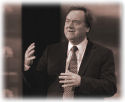FCC chairman expected to back XM + Sirius merger
Though not yet officially announced, reports have surfaced that FCC Chairman Martin supports the merger of XM and Sirius satellite radio companies, and will recommend that the Commission vote to push the transaction through.
The willingness of XM and Sirius to comply with demands set forth for their merger appears to be working. FCC Chairman Kevin J. Martin said on Sunday that he will support the combination of the two satellite radio providers given their adherence to certain stipulations.
As conditions for the Department of Justice's approval of the deal last March, the combined satellite radio entity must put a cap on subscription prices for three years, offer a la carte programming (where subscribers select which content they get), provide firmware-upgradeable interoperable receivers, open its standards to third-party device manufacturers, and devote 8% of its spectrum (24 channels) to noncommercial and minority-interest programming. Those conditions are based upon promises that both companies made to legislators and DOJ officials between March 2007 and January 2008.
 |
| FCC Chairman Kevin Martin |
A merger of the two companies will reverse the FCC's 1997 licensing agreement which dictated that the two companies never become one. Opposition groups such as the National Association of Broadcasters have been pressuring the FCC to challenge the merger, as it is one of the final regulatory bodies the two companies must face before they can proceed. When the Commission finally votes -- which the Washington Post says could take place this week -- the merger must be approved by three of five commissioners.
![]()
4:45 pm EDT June 16, 2008 - Not to be outdone, the National Association of Broadcasters this afternoon issued its statement on the reports regarding FCC Chairman Martin's favorable outlook for the merger, saying how unlikely it believes approval will be.
"Given their systematic breaking of virtually every rule set forth by the FCC in their 11 years of existence," the statement reads, "it would be curious if the Commission now rewards XM and Sirius with a monopoly."
It then goes on to claim the two companies have yet failed to develop an interoperable radio receiver, as per legislation, and then accuses both Sirius and XM of operating beyond the interference regulations set forth by the FCC. It points to a free admission by Sirius from its Annual report in 2007 that "certain Sirius personnel requested manufacturers to produce Sirius radios that were not consistent with the FCC's rules,"
In the NAB's citation, however, the framing sentences around the prior statement were omitted for effect, which were: "We are cooperating with the FCC in its ongoing inquiry," and "We are taking significant steps to ensure that this situation does not happen again, including the adoption of a comprehensive compliance plan, approved by our board of directors, to ensure that our products comply with all applicable FCC rules."
Furthermore, the NAB accused both XM and Sirius of noncompliance and broadcasting "too strongly," which has resulted in interference for non-satellite users. Citing a 2007 Baltimore Sun article, the group claims, "Such interference resulted in some Christian radio listeners being inundated by Howard Stern programming."
This assertion seems to be contradicted by the HD Radio FAQ which explains to the layperson that satellite services are a digital broadcast and cannot be picked up by other devices, even digital HD radios: "XM and Sirius are digital formats, but they are distributed by satellite and require their own receiving equipment."
| BetaNews' legislative issues stories all this week are dedicated to the life and memory of Tim Russert, NBC News Washington Bureau Chief. Donations in his honor may be made to Catholic Charities USA. |  |
